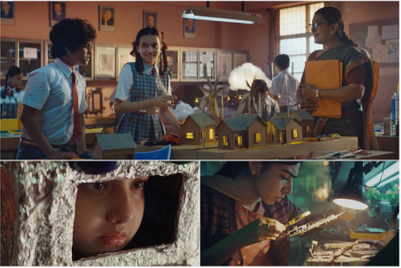Eurocentric beauty standards are the primary reference point for search algorithms and beauty filters on social media apps. But women of color are disproportionately excluded from STEM, which leads to “coded bias,” or racial bias in facial recognition algorithms.
On Monday, Olay launched #DecodetheBias, a campaign in honour of National Coding Week. Created by Badger & Winters, the campaign includes a 60-second spot featuring Joy Buolamwini, founder of the Algorithmic Justice League (AJL). Buolamwini’s work was highlighted in the Netflix film, Coded Bias.
In the spot, Buolamwini shows how search terms like “beautiful face,” “beautiful skin” and “beautiful woman,” don’t turn up results that feature women of color. “Who gets to be beautiful online is decided by code and society,” Buolamwini says. “And women of colour, we’re being left out.”
“We wanted to prompt consumers and the beauty industry to question, ‘Where are the women of colour?’” Stephanie Headley, VP of Olay, P&G, told Campaign US. “We wanted to create a vision of what a more inclusive representation of beauty would actually look like and give people some tangible actions to take.”
#DecodetheBias aims to double the number of women in STEM and triple the number of women of color (WOC) in STEM by 2030. Olay has partnered with the non-profit organization Black Girls Code to send 1,000 girls of colour to its 2022 summer camp, which covers robotics, game design, iOS app development and more subjects in the tech industry.
Olay is encouraging people to use the hashtag #DecodetheBias on Instagram and Twitter to help send up to 1,200 more girls to the summer program.
The P&G-owned brand is also committed to change its own beauty biases inside the company. Olay audited its Skin Advisor, a web-based tool that uses a selfie image to recommend skincare products. AJL’s audit partner ORCAA (O’Neil Risk Consulting & Algorithmic Auditing) assessed the AI to determine issues of bias and recommend steps for remediation.
Olay first committed to women in STEM in 2019, when it launched its the #MakeSpaceforWomen campaign at the Super Bowl that year. The brand also donated $500,000 to Girls Who Code to support future female scientists, engineers, programmers and space explorers.
In 2020, Olay pledged $1 million to support women in STEM with initiatives such as: A $520,000 donation to the United Negro College Fund (UNCF), donating “science-lessons-in-a-box,” created by Olay scientists, to encourage learning in a virtual environment and more.
Olay plans to continue fighting bias beyond the campaign, across all facets of the brand.
“We're going to remain committed to achieving gender parity by 2030,” Headley said. “We're also committed to being more inclusionary on who we feature in front of and behind the camera. The products we create are often inspired by women and women of colour. And in our commitment to ensure that, we have directors who are representative of women and people of colour.”


+(900+x+600+px)+(3).png&h=334&w=500&q=100&v=20250320&c=1)
+(900+x+600+px).jpg&h=334&w=500&q=100&v=20250320&c=1)
.jpg&h=334&w=500&q=100&v=20250320&c=1)


.jpg&h=334&w=500&q=100&v=20250320&c=1)
+(900+x+600+px).png&h=334&w=500&q=100&v=20250320&c=1)

+(900+x+600+px)+(1).png&h=334&w=500&q=100&v=20250320&c=1)





.jpg&h=268&w=401&q=100&v=20250320&c=1)


